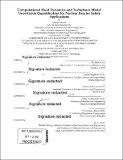| dc.contributor.author | Acton, Michael
(Michael John) | en_US |
| dc.contributor.other | Massachusetts Institute of Technology. Department of Nuclear Science and Engineering. | en_US |
| dc.date.accessioned | 2021-12-17T17:09:08Z | |
| dc.date.available | 2021-12-17T17:09:08Z | |
| dc.date.copyright | 2020 | en_US |
| dc.date.issued | 2020 | en_US |
| dc.identifier.uri | https://hdl.handle.net/1721.1/138529 | |
| dc.description | Thesis: Ph. D., Massachusetts Institute of Technology, Department of Nuclear Science and Engineering, February, 2020 | en_US |
| dc.description | Manuscript. | en_US |
| dc.description | Includes bibliographical references (pages 185-192). | en_US |
| dc.description.abstract | Computational fluid dynamics (CFD) simulations are becoming an increasingly important tool across a wide range of engineering disciplines. CFD simulations improve the accuracy and predictive capability of the evaluation process through numerical solution of the Reynolds-Averaged form of the Navier-Stokes (RANS) equations describing fluid flow. Uncertainty arises in CFD simulations due to a variety of sources, and this uncertainty must be rigorously quantified in order to be useful in support of reactor licensing and decision making. In traditional system thermal hydraulics codes, the code scaling, applicability, and uncertainty (CSAU) approach is used to ensure simulation quality and to estimate the level of uncertainty present. No such method is presently available for CFD. This thesis discusses the pathway for utilizing CFD in reactor licensing applications in the face of uncertainty through the introduction of CFD-CSAU. In order to do this, modifications to the CSAU method are proposed to bring the process in line with requirements of CFD. This includes processes to ensure the quality of a simulation which are utilized in the CFD verification and validation community, but which are not currently utilized. In addition to ensuring simulation quality and confidence, a rigorous estimate of simulation uncertainty must be made. Emphasis is placed on the quantification of turbulence modeling uncertainty in a predictive context, as it is the clear missing link in the handling of CFD uncertainty. Previous work has commonly focused on the propagation of uncertainty due to turbulence model calibration coefficients, however such an approach ignores much of the uncertainty associated with the turbulence model, and does not extrapolate well to a full variety of flow conditions. In this work, a novel approach is discussed which is based on treating the uncertainty directly through the turbulent viscosity field (pt). This allows for a more complete treatment of the modeling uncertainty compared to the uncertainty in the calibration coefficients. As the turbulent viscosity takes on unique values in continuous space, the uncertainty must be modeled as a random field, defined by the marginal distribution and the covariance function. These properties are defined through two unique hyper-parameters, which are inferred on a training data set and applied to a variety of validation data sets. The approach is shown to generalize well to a wide variety of turbulent test cases in the accurate prediction of uncertainty bounds especially as compared to previous methods. The applicability for a representative reactor flow condition is demonstrated. | en_US |
| dc.description.statementofresponsibility | by Michael Acton. | en_US |
| dc.format.extent | 192 pages | en_US |
| dc.language.iso | eng | en_US |
| dc.publisher | Massachusetts Institute of Technology | en_US |
| dc.rights | MIT theses may be protected by copyright. Please reuse MIT thesis content according to the MIT Libraries Permissions Policy, which is available through the URL provided. | en_US |
| dc.rights.uri | http://dspace.mit.edu/handle/1721.1/7582 | en_US |
| dc.subject | Nuclear Science and Engineering. | en_US |
| dc.title | Computational fluid dynamics and turbulence model uncertainty quantification for nuclear reactor safety applications | en_US |
| dc.type | Thesis | en_US |
| dc.description.degree | Ph. D. | en_US |
| dc.contributor.department | Massachusetts Institute of Technology. Department of Nuclear Science and Engineering | en_US |
| dc.identifier.oclc | 1281705834 | en_US |
| dc.description.collection | Ph. D. Massachusetts Institute of Technology, Department of Nuclear Science and Engineering | en_US |
| dspace.imported | 2021-12-17T17:09:08Z | en_US |
| mit.thesis.degree | Doctoral | en_US |
| mit.thesis.department | NucEng | en_US |
